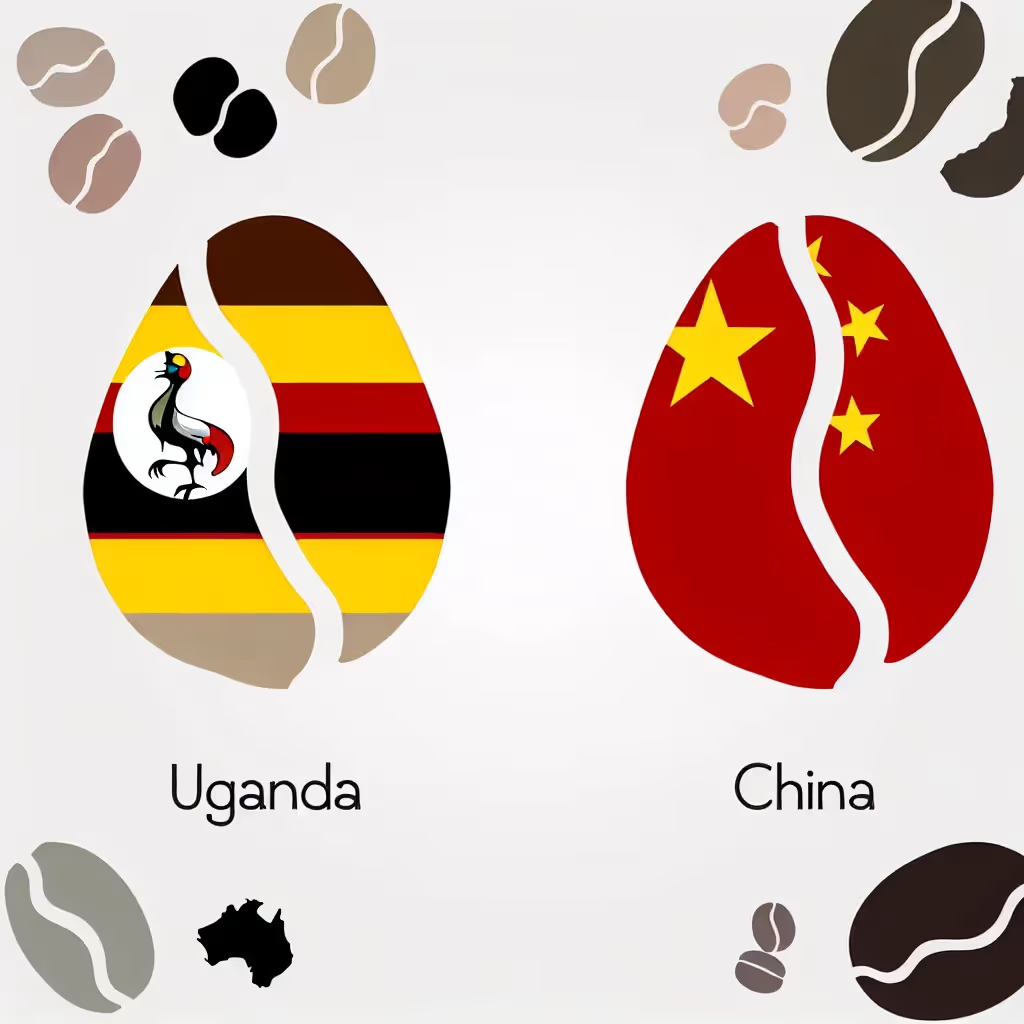Ugandan Vs. Chinese Coffee
This comparison explores the distinctive qualities of Ugandan and Chinese coffee, highlighting their unique flavor profiles, growing conditions, and cultural significance in the specialty coffee market.

Brief Description
Ugandan coffee, particularly from the Mount Elgon region, is known for its rich, full-bodied flavor profile with a distinctive wine-like acidity. Grown in the fertile volcanic soils of Eastern Uganda, these beans benefit from high altitudes and ample rainfall. The result is a complex cup with notes of dark chocolate, citrus, and sometimes a subtle floral undertone. Ugandan coffee has been gaining recognition in the specialty coffee market for its unique characteristics and improving quality standards.
Chinese coffee, primarily grown in Yunnan Province, is an emerging player in the specialty coffee scene. Known for its smooth body and unique flavor profile, Chinese coffee often surprises with its complexity. The region's diverse microclimates and ancient tea-growing traditions contribute to the distinct character of these beans, offering a fascinating blend of familiar coffee notes with subtle, exotic undertones.
Importance of Comparison
Comparing Ugandan and Chinese coffee is crucial for coffee enthusiasts seeking to expand their palate beyond traditional origins. These emerging players in the specialty coffee scene offer unique flavor experiences that reflect their distinct terroirs. Understanding their differences helps consumers make informed choices and appreciate the diversity of global coffee production.
Key Attributes
Origin
Ugandan
Chinese


Consumer Guide
When choosing between Ugandan and Chinese coffee, consider your flavor preferences. Ugandan coffee, particularly from Mount Elgon, offers a full-bodied experience with wine-like acidity and notes of dark chocolate and citrus. It's ideal for those who enjoy a complex, bold cup. Chinese coffee from Yunnan Province provides a smoother body with unique chocolate and nutty flavors, perfect for those seeking a more subtle, exotic taste. Both origins work well with various brewing methods, including French Press, Pour-over, and Espresso. For a bright, fruity experience, opt for Ugandan beans. If you prefer a mellower, nuanced cup, Chinese coffee might be your best choice. Always check the roast date and opt for freshly roasted beans to fully appreciate the unique characteristics of each origin.
Expert Opinions
Coffee expert Maria Rodriguez notes, 'Ugandan coffee has been making waves with its intense flavors and improving quality standards. It's a hidden gem for those who love African coffees.' On Chinese coffee, master roaster John Chen states, 'The complexity of Chinese coffee from Yunnan is truly remarkable. It's bridging the gap between traditional coffee notes and the subtle nuances we often associate with fine teas.'
FAQs
Ugandan coffee typically offers a rich, full-bodied experience with notes of dark chocolate, citrus, and red berries, complemented by a wine-like acidity. Chinese coffee, on the other hand, presents a smoother body with flavors of chocolate, nuts, and earthy undertones, often surprising with its complexity and subtle exotic notes.
Both Ugandan and Chinese coffees can make excellent espresso, but they offer different experiences. Ugandan coffee's full body and intense flavors can create a rich, complex espresso with pronounced acidity. Chinese coffee might produce a smoother, more nuanced espresso with subtle exotic undertones. The choice depends on personal preference and desired flavor profile.
Ugandan coffee, particularly from the Mount Elgon region, is grown at altitudes of 1200-2200m in volcanic soils with ample rainfall. Chinese coffee from Yunnan Province is typically grown at 1200-2000m in diverse microclimates. Both benefit from high altitudes, but Uganda's volcanic soils and China's ancient agricultural traditions contribute to their distinct flavor profiles.
Both Ugandan and Chinese coffee producers employ similar processing methods, including washed, natural, and honey processing. These varied techniques allow for diverse flavor profiles within each origin, giving coffee enthusiasts a wide range of taste experiences to explore from both countries.
Uganda produces significantly more coffee annually, with approximately 300,000 metric tons compared to China's 130,000 metric tons. This difference reflects Uganda's longer history as a coffee-producing nation, while China is a relative newcomer to the global coffee market, with production centered mainly in Yunnan Province.
Both Ugandan and Chinese coffees are increasingly recognized in the specialty coffee market. Uganda has been improving its quality standards and gaining recognition for its unique characteristics. Chinese coffee, particularly from Yunnan, is emerging as a player in the specialty scene, offering distinctive flavors that set it apart from traditional coffee origins.
Conclusion
Ugandan and Chinese coffees offer unique and exciting experiences for coffee enthusiasts. Ugandan beans provide a bold, complex cup with vibrant acidity and rich flavors, ideal for those who enjoy full-bodied African coffees. Chinese coffee surprises with its smooth character and subtle, exotic notes, perfect for adventurous drinkers seeking new flavor horizons. Both origins showcase the diversity of global coffee production and are worth exploring. Whether you prefer the intense, fruity notes of Ugandan coffee or the nuanced, smooth profile of Chinese beans, both offer high-quality options for various brewing methods. As these origins continue to gain recognition in the specialty coffee world, they present excellent opportunities for coffee lovers to expand their palates and appreciate the unique terroirs of Uganda and China.






